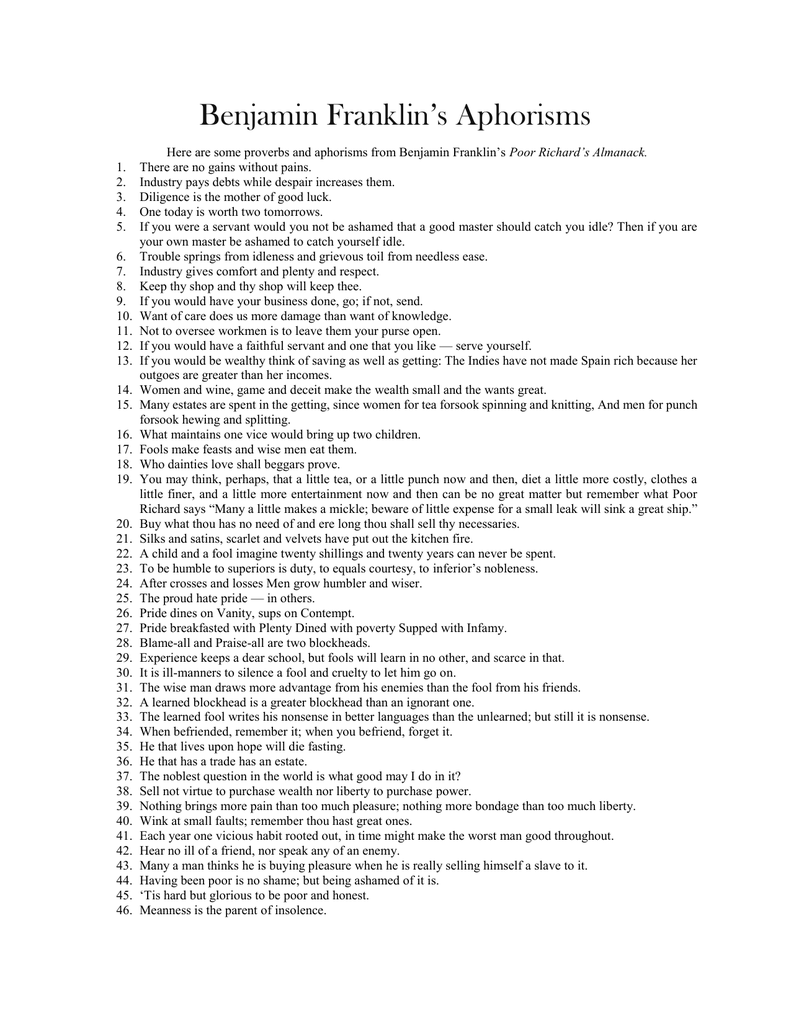Benjamin Franklin, one of the Founding Fathers of the United States, was not only a statesman and inventor but also a master of pithy sayings and wisdom. His aphorisms, often steeped in humor and practicality, continue to resonate with people today, offering insights into human nature and the art of living. These short, memorable statements encapsulate Franklin's philosophy and provide guidance for navigating life's challenges. In this article, we will explore the life of Benjamin Franklin, delve into his most impactful aphorisms, and examine their relevance in today's world.
Franklin's knack for distilling complex ideas into simple, relatable phrases made him a beloved figure in his time and ensures his legacy endures. His aphorisms cover a wide range of topics, including work ethic, relationships, and personal growth. By reflecting on these sayings, we can gain a deeper understanding of Franklin's worldview and apply his wisdom to our own lives. Join us as we journey through the mind of one of history's greatest thinkers, uncovering the lessons embedded in his timeless words.
As we navigate the complexities of modern life, Franklin’s aphorisms serve as a beacon of clarity. They encourage us to think critically, act wisely, and lead lives of purpose. Whether you seek motivation, insight, or simply a good laugh, the wisdom of Benjamin Franklin offers something for everyone. Let’s explore the profound yet accessible knowledge embodied in his aphorisms, and discover how they can guide us in our daily endeavors.
Who Was Benjamin Franklin?
Benjamin Franklin was born on January 17, 1706, in Boston, Massachusetts. He was the fifteenth of seventeen children in a modest family. Despite limited formal education, Franklin became a successful printer, writer, and inventor. His contributions to the Enlightenment and American society were vast, making him a pivotal figure in early American history.
What Are Some Key Personal Details About Franklin?
| Detail | Information |
|---|---|
| Full Name | Benjamin Franklin |
| Birth Date | January 17, 1706 |
| Birthplace | Boston, Massachusetts |
| Occupation | Printer, Writer, Inventor, Statesman |
| Key Contributions | Founding Father, Author of “Poor Richard’s Almanack,” Discovery of electricity, Diplomat |
| Death Date | April 17, 1790 |
What Are Benjamin Franklin’s Most Famous Aphorisms?
Franklin's aphorisms are a treasure trove of wisdom. Here are some of the most notable ones:
- "An ounce of prevention is worth a pound of cure."
- "Well done is better than well said."
- "Lost time is never found again."
- "A penny saved is a penny earned."
- "Tell me and I forget, teach me and I remember, involve me and I learn."
How Do Benjamin Franklin’s Aphorisms Reflect His Philosophy?
Franklin's aphorisms often embody his pragmatic approach to life. His belief in hard work, thriftiness, and continuous learning is evident in many of his sayings. For instance, "A penny saved is a penny earned" underscores the importance of frugality, while "An ounce of prevention is worth a pound of cure" emphasizes foresight and preparation. Each saying serves as a reminder to prioritize actions that lead to long-term benefits.
Why Are Franklin’s Aphorisms Still Relevant Today?
The timeless nature of Franklin’s aphorisms lies in their universal truths. In an age where instant gratification reigns, his wisdom encourages patience and diligence. These sayings resonate with individuals seeking guidance in various aspects of life, including personal finance, relationships, and career development. For example, "Well done is better than well said" serves as a call to action, urging people to focus on results over mere talk.
What Lessons Can We Learn from Benjamin Franklin’s Aphorisms?
Franklin's aphorisms offer numerous life lessons that remain applicable today. Here are a few key takeaways:
- Value of Hard Work: Franklin’s emphasis on hard work and dedication is encapsulated in sayings like "There are no gains without pains." This reminds us that success requires effort.
- Importance of Knowledge: His belief in lifelong learning is evident in "Tell me and I forget, teach me and I remember, involve me and I learn," encouraging us to seek knowledge actively.
- Financial Prudence: Franklin’s views on saving and financial management are timeless, as shown in "A penny saved is a penny earned," urging us to be mindful of our expenditures.
- Community and Relationships: His aphorisms often highlight the significance of community and relationships, such as "A friend in need is a friend indeed," emphasizing the value of supportive connections.
How Can We Apply Benjamin Franklin’s Aphorisms in Our Daily Lives?
Incorporating Franklin's aphorisms into our daily routines can enhance our lives significantly. Here are a few practical ways to do so:
- Set Clear Goals: Use Franklin's principle of planning ahead to set clear, achievable goals in your personal and professional life.
- Practice Frugality: Adopt a mindset of saving and budgeting, remembering that every small saving adds up over time.
- Embrace Lifelong Learning: Engage in continuous education, whether through formal courses or self-directed reading and exploration.
- Foster Relationships: Invest time in building and maintaining relationships, recognizing the importance of community and support.
What Is the Legacy of Benjamin Franklin’s Aphorisms?
Benjamin Franklin's aphorisms have left an indelible mark on society. They have been passed down through generations, influencing not only American culture but also global perspectives on wisdom and human behavior. His ability to articulate complex ideas into simple expressions has made his sayings timeless, ensuring they remain relevant to each new generation. As we reflect on his words, we find guidance and inspiration to navigate our own lives with wisdom and integrity.
In conclusion, the aphorisms of Benjamin Franklin encapsulate a wealth of knowledge and insight that continues to inspire us today. By embracing his teachings, we can lead more fulfilling and purposeful lives, just as he did. Remember, the wisdom of Franklin is not just for reflection; it’s meant for action. So, let’s take those lessons to heart and apply them in our everyday lives.


